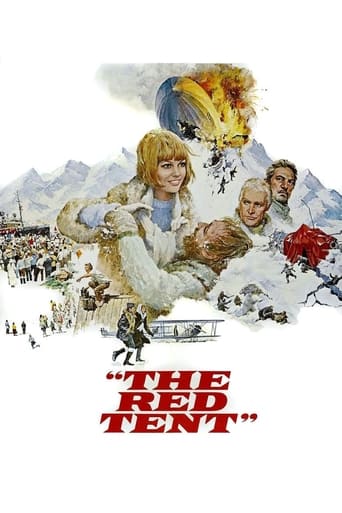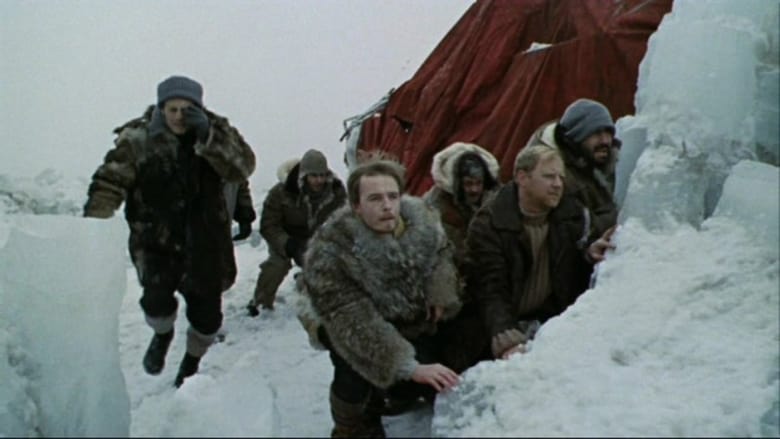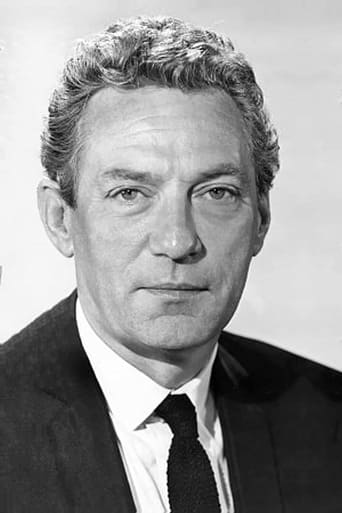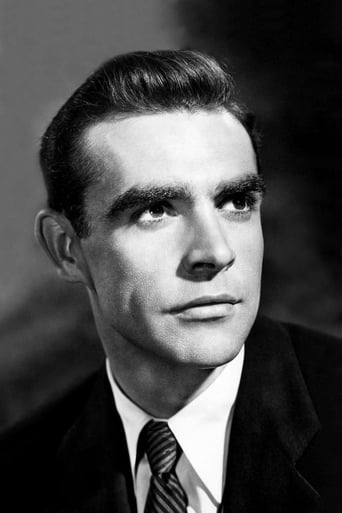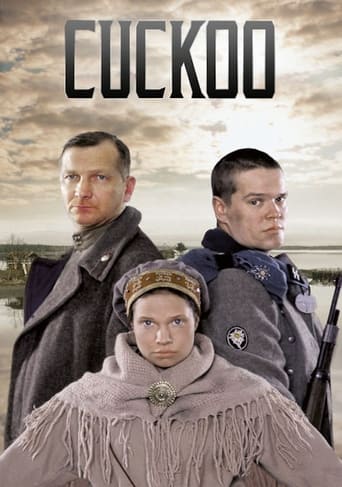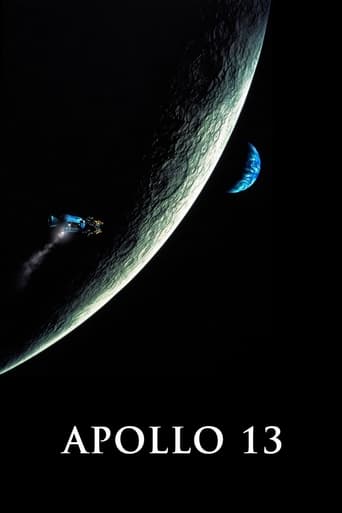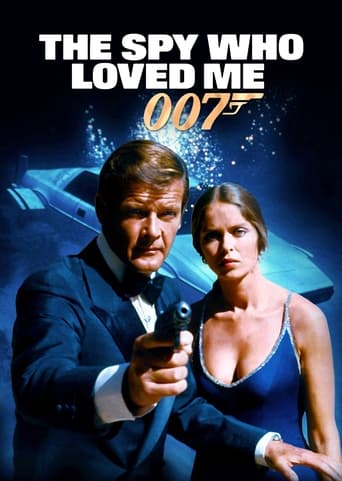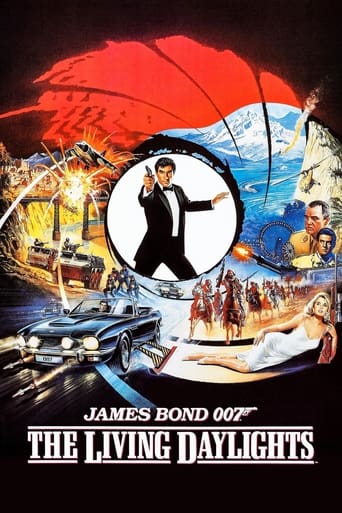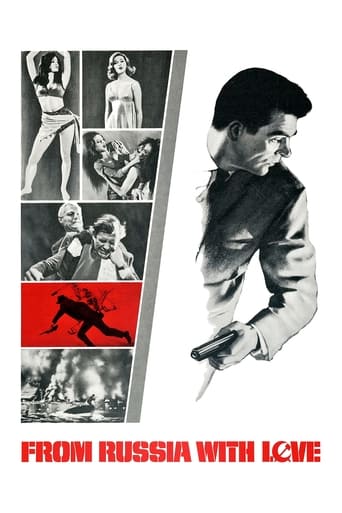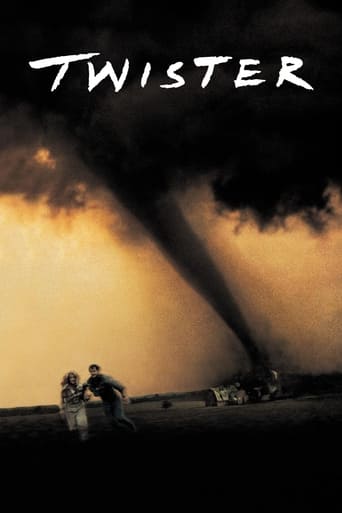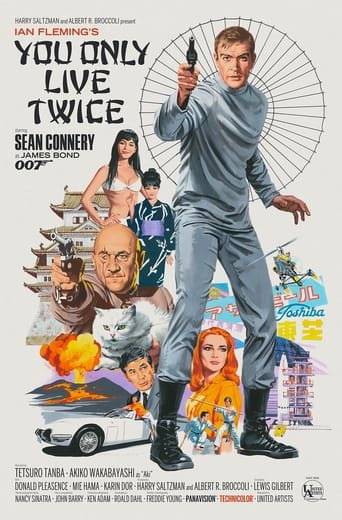The Red Tent (1969)
Torn by personal guilt, Italian General Umberto Nobile reminisces about his 1928 failed Arctic expedition aboard the airship Italia.
Watch Trailer
Cast


Similar titles
Reviews
i must have seen a different film!!
It's the kind of movie you'll want to see a second time with someone who hasn't seen it yet, to remember what it was like to watch it for the first time.
Although I seem to have had higher expectations than I thought, the movie is super entertaining.
All of these films share one commonality, that being a kind of emotional center that humanizes a cast of monsters.
atching THE RED TENT gave me that rare fulfillment and dramatic wholesomeness one can only get from a stonecold classic, a CITIZEN KANE or a ONCE UPON A TIME IN THE WEST. Granted it doesn't compare to these or other heavily praised list toppers and film behemoths, mainly due to questions of style and cinematic pioneering (or lack thereof as the case may be), it still deserves more than the meagre 500 votes and 6.6. rating it has here.As far as I can tell the story is faithful to the real events that transpired in 1928 during and after General Nobile's first attempted expedition to the North Pole by air. His airship (zeppelin), 'Italia', was forced to abandon its mission due to forbidding weather conditions and return home. On the way back it was shipwrecked on the ice somewhere 100 miles away from its base at Kingsbay island and the handful of survivors that weren't blown away with the keel were forced to carve a meagre, frostbitten existence as they waited for rescue parties. Three years earlier famous polar explorer Roal Amundsen had flown over the Pole using another of Nobile's airships, the 'Norge', and it was the subsequent fight for who deserved the most credit (engineer, explorer or airship pilot) that led to Nobile's fateful expedition with 'Italia'. The amount of bad luck involved in that expedition, the one month the survivors huddled together in the freezing arctic wasteland waiting for rescue, and the mishaps that plagued rescue parties, in both air and sea, is staggering to think. To watch it all unravel in 2 hours makes for a haunting experience.You don't need to trawl Wikipedia for info on the events before sitting down to watch the movie. The first few minutes consist of very tastefully done 'period' footage of Nobile's expeditions, as the aged general watches newsreels of the events on a TV. After all these years Nobile (Peter Finch) is still plagued by guilt, slowly eroding his soul with questions he can't possibly answer. But the dead can and it's their authority to judge him. And so Nobile invokes them in his living room, figments of his guilt-crazed imagination, the dead imperative personified as nemesis divina. People that died and people that survived are summoned by and in Nobile's mind to absolve or condemn him for his actions. The old general coping with his guilt and from these discussions the bulk of the story unfolds in the form of long flashbacks.Needless to say that if you have even a remote interest in polar explorations (or any kind of explorations really, as all of them, from the old west to the moon, are but retreads on the same path) and generally survival adventures on harsh environments, this is a must see. Unlike Scott's fateful expedition in the South Pole however, the tragic end here remains internalized, mostly taking place inside Nobile's soul as he finds himself unjustly branded a coward and deserter upon his return. But the stark nature of the windblasted arctic landscape and the men trying beyond all hope to survive in it offers its fair share of physical bleakness.This Italorussian co-production spared no corners in the budget. This is a lavish production with hundreds of extras, an icebreaker ship tearing through the ice and some truly breathtaking photography shot on location (or some location that passes for the North Pole at least, Siberia must be full of 'em). With an international cast that includes Peter Finch (capturing the anguish and despair at the heart of the protagonist without resorting to the overbearing histrionics that earned him the Oscar in '77 over DeNiro's Travis Bickle), Claudia Cardinale (without doubt the most astonishingly beautiful woman on the planet in the late 60's), Sean Connery (in a small role as Roald Amundsen) and Mario Adorf (familiar face from many Italian b-movies), a rousing score by maestro Ennio Morricone, and sturdy direction by Mikhail Kalatozov (five years after I AM CUBA), this really is a lost classic any way you slice it up and just a great f-cking movie.As much a poignant character study on guilt and memory (Nobile needs only his own forgiveness in the end and it's his memory that punishes him a thousand times for things out of his control), as it is a stark piece of survival grit, THE RED TENT deserves a larger audience. You be it.
This Italian-Russian endeavor is a lost treasure and one of the great historical dramas. The movie is really a dream of General Nobile, a survivor and commanding officer of the Italia, a dirigible that met with disaster in a grand Artic exploration during the Mussolini era. It is about the psychology of guilt, accountability, and leadership. Beyond the human psychological profile of the film, it captures the harsh, expansive grandeur of nature better than almost any movie I've seen. The cinematography of the Artic is unlikely to be ever met again with the computer-generated film of today. The Russian ice-breaker ship which rescues the Italian crew survivors requires no special effects and remains a challenge for today's movie producers to emulate. The iceberg film sequences were spectacular. Sean Connery, Claudia Cardinale, Peter Finch and the rest of the cast give very fine acting performances. Ennio Morricone composes one of his greatest scores. As great as a film composer he is, he still is not remembered for one of his most haunting compositions in this film. There is an equally beautiful soundtrack in the Russian version by composer Aleksandr Zatsepin. It is a shame this film was not recognized perhaps in part due to its Soviet influence in a Hollywood-dominated market. It is a bit rough around the edges (meaning editing and directing could be smoother) but in terms of great film-making, it rarely gets better. When you watch it a couple times, you begin to appreciate the raw beauty and human drama of this film.
Since viewing this film 35 years ago I have been in awe of it, it is certainly my all-time favorite and would most likely get my nomination for best film ever. On this point I probably stand in splendid isolation (or to quote Finn Malmgren: "emptiness, loneliness, beauty, and purity"). I mention this in the hope that this will encourage readers to view the film. If you are seeking a comparison, "Krasnaya Palatka" ("The Red Tent") is most like the original "Flight of the Phoenix"; both are superficially action adventure films, with deep allegorical elements about the dynamics behind the functioning of a civilized society. "The Red Tent" even gets a little philosophical along the lines of life as a journey and not a destination.This is Director Mikheil Kalatozishvili's tribute to Sergei Eisenstein, a disorienting yet organized montage of vast scale juxtaposed with claustrophobic confinement (its worth watching again just to focus on the scene transitions-the editing is brilliant). The scenes inside the dirigible and the red tent (the title character) are carefully cut into spectacular exterior shots of arctic landscapes and the dynamic energy of crowds in the Russian countryside and city. There is a fusion of European expressionism with Hollywood realism in this film unlike anything I have ever seen before. This is possible because of the storytelling device of having everything unfold in flashbacks by the main character General Nobile (Peter Finch). Nobile was the organizer and commander of Italy's ill-fated attempt to reach the North Pole by dirigible. This generally true (certain historical liberties are taken to simplify things) story is told entirely from his point of view. Forty years after the expedition Nobile is a disgraced figure living in Rome and burdened by guilt and sleeplessness. You learn that on sleepless nights he conjures up participants in the expedition fiasco (both members and rescuers), letting them judge him for his actions 40 years ago. These sessions have been largely inconclusive but this night he pulls out all stops and convenes a full trial in his living room-with almost all the central figures present. More importantly, for the first time he names the ruthless Lundborg (Hardy Kruger) as his prosecutor-a move that Lundborg assures him will mean that the jury will reach a verdict for the first time. These are not ghosts but rather figments of Nobile's imagination and they behave according to his perception of how they would behave. This storytelling device allows the film to have its own commentary, making it not just an exciting adventure film with wonderful visuals, but an examination of the concept of leadership (much like "Command Decision", "A Gathering of Eagles", and "They Came to Cordura"). More importantly it becomes an allegorical study about free will and destiny, as careful planning and good judgment are just two factors in any complex operation; subject to luck and unforeseen events.The many characters are a representative cross section of society; with heroes, opportunists, martinets, dreamers, and average Joes. Ultimately, things happen (both good and bad) not because of the challenge of man versus nature, but because of the placement and misplacement of human resources (i.e. the right or wrong person assigned to a particular role in the expedition and the rescue efforts). From the events portrayed in the "The Rent Tent" it is difficult to fault Nobile as a leader. He wisely turns back to Kings Bay when the weather gets bad, he is genuinely devastated at the loss of some of his men, and his actions after the crash are all reasonable. He can be blamed for allowing Lundborg to bring him out before his men but under the circumstances it was a sensible decision if not a politically correct one. As Samoilovich, Captain of the Russian Icebreaker Krassin points out, a leader is judged by their actions, and their actions by their results, Nobile's early rescue is the reason the other surviving crewmen are ultimately rescued.Nobile's fantasy trial eventually dredges from his subconscious the realization of why he choose to leave with Lundborg (1000 reasons to stay-1001 to leave). That such a trivial and self-indulgent reason was the difference maker accounts for his continuing guilt. This realization, along with the belief that Amundsen (his peer) is the only one fit to judge him, allows Nobile to finally forgive himself for being human. They go out with Amundsen's advice to reflect not on their failures but on the things they attempted and the wondrous things they saw. There is no guilt in not achieving an ambitious goal, making the attempt is more important than succeeding. The music is also great.Then again, what do I know? I'm only a child.
I reckon I must have seen this as a young boy, probably around the age of 11, in the late 70'es. I saw it on TV at that time. The images of this movie to this day are very vivid in my memory, the ice, and the desperation it depicts. Although I don't recall much of the plot, and perhaps didn't even grasp it completely at the time, a few scenes are simply as etched in my brain: The scene where they struggle to repair the radio with graphite from a pencil. And of course Nobile's talks with the ghosts. I also seem to recall that Amundsen as portrayed by Connery came across as a rather self-righteous and arrogant person.A movie that can make such a lasting impression must possess some significant qualities.

